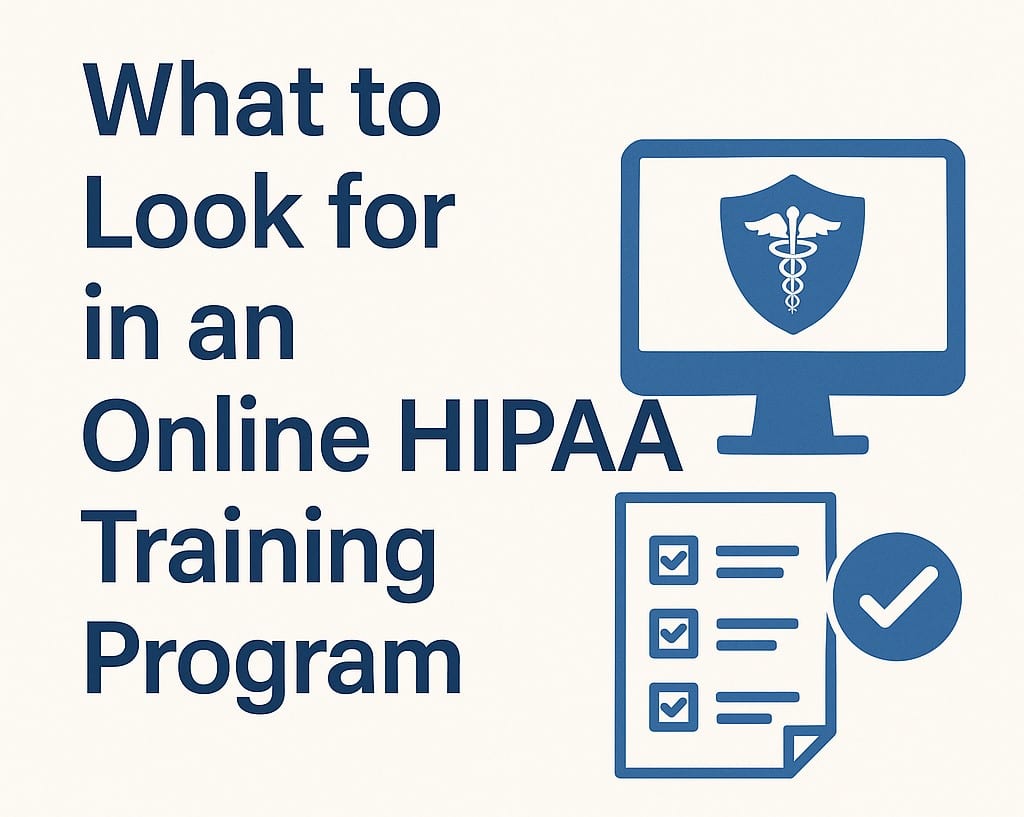In today’s healthcare landscape, protecting patient privacy and maintaining HIPAA compliance isn’t just a legal requirement — it’s a professional responsibility. Whether you’re a healthcare provider, business associate, or employee handling patient data, completing a HIPAA training program is essential to safeguard protected health information (PHI) and avoid costly violations.
However, not all HIPAA training programs are created equal. With dozens of online options available, how do you know which one is right for your organization or career needs?
This guide will help you understand what to look for in an online HIPAA training program, so you can make an informed, compliant, and value-driven choice.
so you can make an informed, compliant, and value-driven choice.
1. Ensure the Course Covers Both HIPAA Privacy and Security Rules
A comprehensive HIPAA training program should go beyond just the basics of the Privacy Rule. It must also address:
-
HIPAA Privacy Rule: Explains patient rights, permissible disclosures, and confidentiality principles.
-
HIPAA Security Rule: Covers safeguards for electronic PHI (ePHI), cybersecurity best practices, and access control.
-
HITECH Act & Omnibus Rule updates: Modern HIPAA programs should reflect recent legislation and enforcement guidance.
Tip: Check the course outline before enrolling. If it doesn’t clearly mention HIPAA Privacy and Security, it may not meet compliance standards.
2. Look for Accreditation and Credibility
An online HIPAA training provider should be recognized by compliance authorities or have a solid reputation within the healthcare industry.
Consider these factors:
-
Is the course developed by HIPAA compliance experts or certified professionals?
-
Does the provider have positive client reviews or serve well-known healthcare organizations?
-
Is the training accepted by auditors or regulators in your state or sector?
A credible provider ensures that your certificate will hold value during audits, inspections, or job applications.
3. Choose a Course Tailored to Your Role
Different employees have different compliance responsibilities. A one-size-fits-all course might not effectively prepare your team.
Look for HIPAA training that offers role-specific modules, such as:
-
For Healthcare Providers and Staff: Focus on patient communication, privacy practices, and PHI handling.
-
For Business Associates: Emphasis on data sharing, vendor agreements, and subcontractor compliance.
-
For IT Professionals: Coverage on encryption, access controls, and cybersecurity measures.
Personalized training ensures each participant learns what’s relevant to their daily responsibilities.
4. Verify That the Program Offers a Valid Certificate of Completion
A HIPAA compliance certificate is your proof of training — often required by employers, contracts, and auditors.
Ensure the online course provides:
-
A printable certificate of completion upon passing the final exam.
-
Details like the training date, participant name, and course title.
-
Option for organization-wide documentation if you’re training a group of employees.
Some providers even offer downloadable reports for audit readiness — a valuable feature for compliance officers and HR departments.
5. Check for Interactive and Engaging Learning Features
Let’s face it — compliance topics can be dry. An engaging learning experience helps participants retain important information.
Look for:
-
Multimedia content (videos, case studies, infographics).
-
Quizzes and knowledge checks after each section.
-
Scenario-based training that shows how HIPAA applies in real workplace situations.
These features not only make learning enjoyable but also improve understanding and retention of compliance principles.
6. Confirm Accessibility and Mobile Compatibility
A good HIPAA training program should be accessible anytime, anywhere.
Key accessibility features include:
-
Cloud-based learning: Access from desktop, laptop, or mobile devices.
-
Self-paced modules: Let learners complete training on their own schedule.
-
ADA and Section 508 compliance: Ensures equal access for all participants, including those with disabilities.
Flexible, mobile-friendly learning helps ensure 100% employee participation and completion.
7. Evaluate Customer Support and Technical Assistance
Even the best online platforms can have technical glitches. Choose a provider that offers:
-
Responsive customer support (email, chat, or phone).
-
Access management help for large organizations.
-
Training updates and renewal reminders to maintain compliance year after year.
Reliable support ensures a smooth and stress-free learning experience.
8. Compare Pricing and Group Discounts
While pricing shouldn’t be the only factor, it’s smart to ensure you’re getting good value.
Look for:
-
Affordable individual course pricing (usually between $25–$99 per person).
-
Group or enterprise discounts for large healthcare organizations.
-
Bundle offers that include multiple compliance topics (HIPAA, OSHA, Harassment, Cybersecurity, etc.).
Many reputable training providers offer cost-effective packages that help you save money while ensuring complete compliance.
9. Review Renewal and Refresher Options
HIPAA compliance isn’t a one-time task — it’s an ongoing process. Employees must receive annual refresher training or whenever regulations change.
Select a provider that offers:
-
Annual HIPAA recertification courses.
-
Automatic renewal reminders.
-
Updated content that reflects the latest rule changes and enforcement trends.
Regular updates help ensure your organization remains fully compliant at all times.
10. Read Reviews and Compare Providers
Before making your final choice, read customer testimonials and compare at least two or three providers.
Look for platforms that are transparent about their curriculum, pricing, and certification process.
Some of the best-rated online HIPAA training providers offer demo access or free previews, so you can evaluate their training quality firsthand.
Final Thoughts
Choosing the right online HIPAA training program is an investment in both compliance and professional growth. A high-quality course not only protects patient data but also builds trust, accountability, and confidence across your organization.
When evaluating your options, remember to prioritize:
✅ Comprehensive coverage (Privacy + Security)
✅ Accredited providers
✅ Role-specific content
✅ Valid certification
✅ Ongoing support and updates
By following these guidelines, you’ll be well-equipped to select a training program that ensures your staff stays HIPAA-compliant, confident, and audit-ready.
